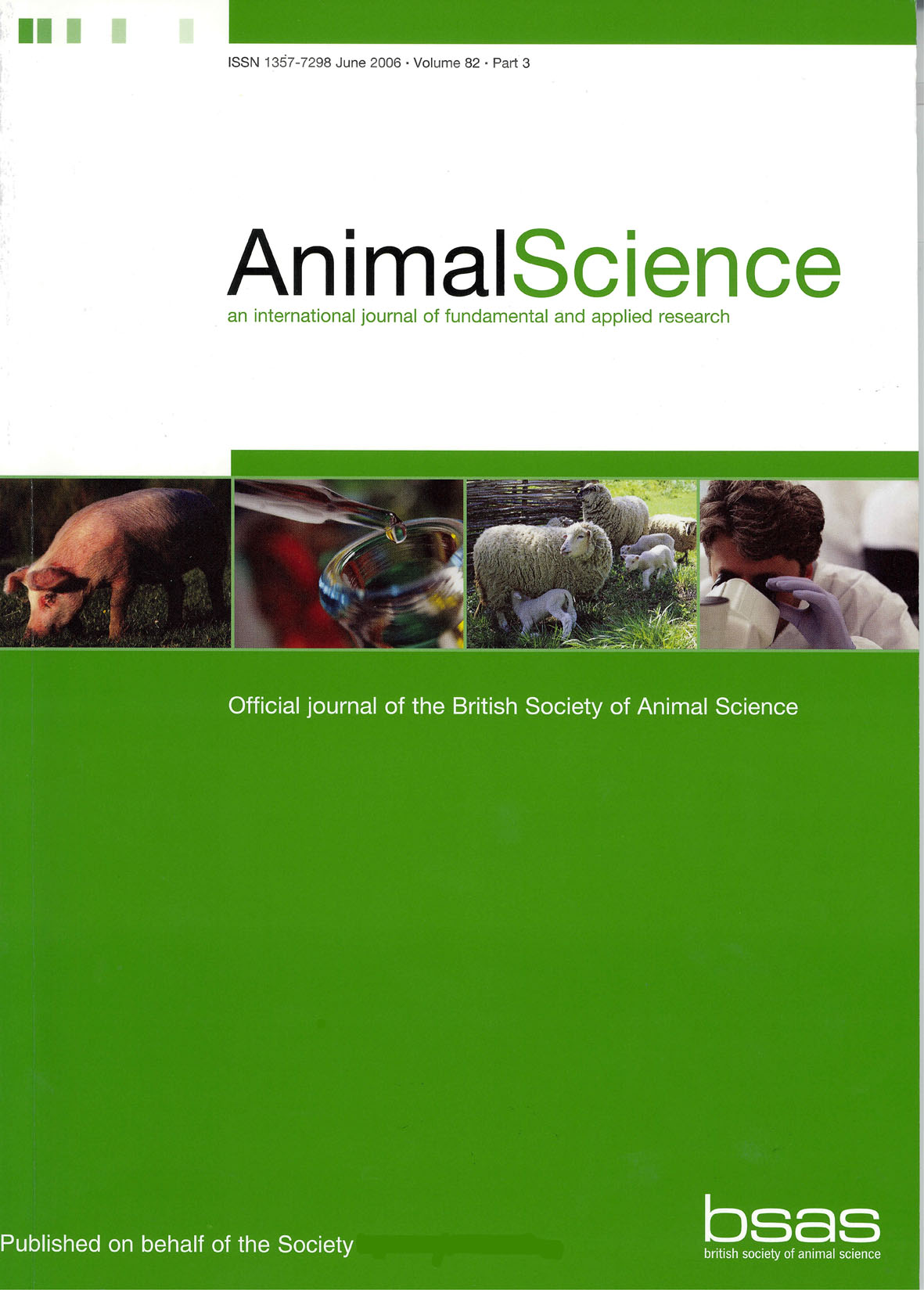Crossref Citations
This article has been cited by the following publications. This list is generated based on data provided by Crossref.
Nichols, J.R.
and
White, J.M.
1964.
Correlation of Meat and Milk Traits in Dairy Cattle.
Journal of Dairy Science,
Vol. 47,
Issue. 10,
p.
1149.
Pirchner, F.
1966.
Züchtungsfragen in der Fleischerzeugung.
Zeitschrift für Tierzüchtung und Züchtungsbiologie,
Vol. 82,
Issue. 1-4,
p.
139.
Langlet, J. F.
Gravert, H. O.
and
Rosenhahn, E.
1966.
Untersuchungen über die Erblichkeit der Fleischleistung bei schwarzbunten Rindern1.
Zeitschrift für Tierzüchtung und Züchtungsbiologie,
Vol. 83,
Issue. 1-4,
p.
358.
Soller, M.
Shilo, A.
and
Bar-Anan, R.
1966.
A note on heritability of live-weight-for-age in Israel-Friesian dairy bull calves and its genetic correlation with milk production.
Animal Science,
Vol. 8,
Issue. 1,
p.
157.
Levi, D.
Soller, M.
and
Shilo, A.
1967.
The effect of age, live-weight and rate-of-gain on dressing percentage and non-saleable fat content of Israel-Friesian bull calves.
Animal Science,
Vol. 9,
Issue. 1,
p.
115.
Hinks, C. J. M.
and
Andersen, B. Bech
1969.
Genetic aspects of growth and carcass quality in veal calves.
Animal Science,
Vol. 11,
Issue. 1,
p.
43.
Tyler, W.J.
1970.
Relationship Between Growth Traits and Production of Milk and Meat.
Journal of Dairy Science,
Vol. 53,
Issue. 6,
p.
830.
Mason, I. L.
Vial, V. E.
and
Thompson, R.
1972.
Genetic parameters of beef characters and the genetic relationship between meat and milk production in British Friesian cattle.
Animal Science,
Vol. 14,
Issue. 2,
p.
135.
Pirchner, F.
and
VonKrosigk, C. M.
1973.
Genetic parameters of cross‐ and purebred poultry.
British Poultry Science,
Vol. 14,
Issue. 2,
p.
193.
Fimland, Erling A.
1973.
Estimates of Phenotypic and Genetic Parameters for Growth Characteristics of Young Potential Al Bulls.
Acta Agriculturae Scandinavica,
Vol. 23,
Issue. 4,
p.
209.
1974.
Intensive Beef Production.
p.
447.
von Krosigk, C. M.
and
Pirchner, F.
1974.
Genotype by type of housing interaction in populations of white Leghorns under reciprocal recurrent selection.
British Poultry Science,
Vol. 15,
Issue. 1,
p.
11.
Bar-Anan, R.
and
Bowman, J. C.
1974.
Twinning in Israeli-Friesian dairy herds.
Animal Science,
Vol. 18,
Issue. 2,
p.
109.
Bar-Anan, R.
Soller, M.
and
Bowman, J. C.
1976.
Genetic and environmental factors affecting the incidence of difficult calving and perinatal calf mortality in Israeli-Friesian dairy herds.
Animal Science,
Vol. 22,
Issue. 3,
p.
299.
Elofson, Lars
Danell, Birgitta
and
Philipsson, Jan
1980.
Combined Index for Milk Production and Growth Rate as Selection Criteria of Performance-Tested Al Bulls.
Acta Agriculturae Scandinavica,
Vol. 30,
Issue. 1,
p.
65.
Miller, R. H.
Lukaszewicz, M.
and
Pearson, R. E.
1981.
Dual‐purpose selection in dairy cattle.
Zeitschrift für Tierzüchtung und Züchtungsbiologie,
Vol. 98,
Issue. 1-4,
p.
108.
Hocking, P. M.
1983.
Live weights at fixed ages of Dairy Shorthorn, Red Friesian, Red Holstein, Meuse-Rhine-Yssel, Simmental and other sire breed progeny of Dairy Shorthorn, Red Friesian and crossbred dams, and estimates of heterosis and apparent heritability.
Animal Science,
Vol. 36,
Issue. 2,
p.
285.
Syrstad, Ola
1983.
Association among production and reproductive traits in cattle.
Zeitschrift für Tierzüchtung und Züchtungsbiologie,
Vol. 100,
Issue. 1-5,
p.
375.
Rattanaronchart, Suwat
Grossman, M.
Mohammad, W.A.
Shanks, R.D.
and
Lee, A.J.
1985.
Sire and Sire-Feeding Regimen Interaction Effects on Lactation, Growth, and Carcass Traits in Dairy Cattle.
Journal of Dairy Science,
Vol. 68,
Issue. 5,
p.
1311.
Purvis, I.W
Piper, L.R
Edey, T.N
and
Kilgour, R.J
1988.
The genetic relationship between ovulation rate and testicular diameter in a random-breeding Merino flock.
Livestock Production Science,
Vol. 18,
Issue. 1,
p.
35.


